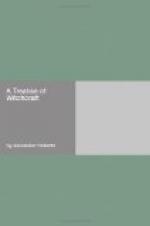[Footnote k: Oratione
in laud[~e] Cypriani eandem historia refert
Nicephorus Calustus lib. 5
cap. 27.]
[Footnote l: Prudentius
+peri stephanon+ de passione Cypriani,
vnus erat iuvenum doctis.
artibus sinistris, fraude pudititia
perstringere. & c]
[Footnote m: Ouid. lib. 2. de art. amand. philtra nocent animis, vimq; fauoris habent. Propertius lib. 4. in laenam quandam consuluitq; striges nostro de sanguine & in me, hippomenes faetae semina legit equae. Vide de his Aristotelem de natura animali[~u] lib. 6. cap. 22. Plini[~u] l. 8. c. 42.]
[Footnote n: Aug. de doctr. Christ. l. 2. c. 22. & 23.]
[Footnote o: Iaquerius
in flagello hereticor[~u] fascinarior[~u],
cap. 6. Martinus de Arles,
p. 436.]
Now concerning beasts they doe oftentimes kill them out-right, and that in sundry manner, or pine and waste them by little and little, till they be consumed.
For [p]the Elements, it is an agreeing consent of all, that they can corrupt and infect them, procure tempests, to stirre vp thunder & lightning, moue violent winds, destroy the fruits of the earth: for God hath a thousand wayes to chasten disobedient man, and whole treasures full of vengeance by his Angels, Diuels, Men, Beasts. For the whole nature of things is ready to reuenge the wrong done vnto the creator.
[Footnote p: Ioh.
Gerson in Trialogio Astrologiae Theologisatae
propos. 16. Palanus in
Syntagmate, l. 5. c. 13]
It were but fruitlesse labour, and ill spent, to bestow long time in confirming this so manifest a truth, and not much better then set vp a candle to giue the Sunnelight when it shineth brightest in mid-heauen: yet to satisfie those who doubt here-of, I will giue a small touch of an example or two.
[q]_Curius Sidius_ the Roman Generall in a battell against Salebus, Captaine of the Moores, in want of water, obtained such abundance of raine from Heauen by Magicall inchantments, that it not onely sufficed the thirst of his distressed Souldiers, but terrified the enemies in such sort, (supposing that God had sent helpe) as of their owne accord, they sought for conditions of peace, and left the field.
[Footnote q: Dion. Cassius Romana Historiae, lib. 60. in Claudio.]
The narration of Olaus[r] Magnus which he maketh of his Northerne Wisards and Witches, would seeme to be meere fictions, and altogether incredible, as of Ericus, who had the winde at command, to blow alwayes from that quarter to which he would set his hat. Or Hagbert, who could shew herselfe in any shape, higher or lower, as she pleased, at one time so great as a Giant, at another as little as a Dwarfe: by whose Diabolicall practises mighty Armies haue beene dicomfited, and sundry others, except the truth hereof were without contradiction approued:




